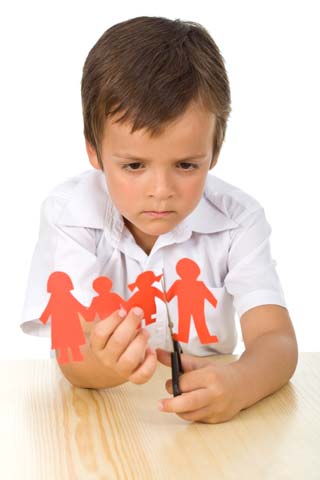When there are children involved, the decision to divorce is one of the most difficult choices two people can make together, even in the worst of times. Tangled up in the emotion of the decision are the many choices that must be made related to the change. One of the most important things to decide is how you will talk to your children about the divorce. Do you tell them individually, or separately? How much do you tell them, and when? While there are no easy answers, professionals do offer some general guidelines that can help you navigate the emotional conversations you will have with your children related to the divorce.

All for One
Experts advise parents to not tell children individually about their plan to divorce. Instead, bring all of the children together and tell them at the same time. If you decided to tell the older children first, for example, not only will they be left to deal with the trauma of the information they’ve just received, but they will be forced to keep a secret from their siblings. By telling them together, the children become instant allies, and they will find a little strength and comfort knowing they’re in it together (this is especially important when you start talking about child custody).
Make No Assumptions
Even if you think you know how your children will react to the news that their parents are divorcing, don’t assume too much. You might think they will feel blindsided or devastated, or happy that the drama will finally be over. Regardless of the current household dynamics, the loss of the family unit is devastating, whether the children are aware of any issues between their mom and dad or not. Tread lightly with them and be prepared for a range of emotions that could frequently change direction.
Act Like Adults
News of a divorce is sometimes more confusing and devastating for the children than it is for the parents. Even if one parent doesn’t want the divorce, feels wronged, or thinks they’re going to be left holding the bag, it’s critical that you both act like adults. Consider the children’s needs above your own, tell the children together in order to put on a united front, and jointly let them know that the decision has nothing to do with them. Children feel a sense of relief when their parents behave rationally while giving them bad news.
Don’t Tune Out
Negative subjects and hostile emotions are things we have natural aversions to, but when it comes to the subject of divorce it’s very important that we maintain an open door policy with our children. It will be uncomfortable to have to face difficult questions about why you’re divorcing and what the future will look like for your children, but, as the parents, it’s your responsibility to answer those tough questions. Additionally, when they are overcome with emotion, they need a soft place to land, so be there for them when they cry or become confused and angry. Try not to be defensive. Just listen. It’s okay not to have all the answers, but it’s not okay to avoid the questions.
Divorce is traumatic for everyone involved, especially the children who often feel like they’re caught in the middle. By maintaining focus on their needs during this difficult process, you will make it easier for them, and it will help them heal much more quickly.

